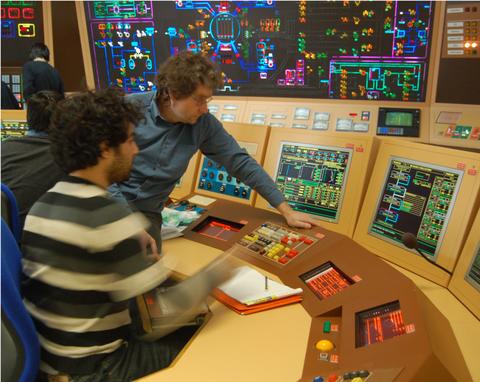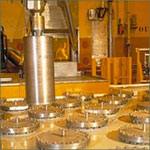
M2 - Nuclear engineering course (IN)
Training co-accredited with instn
The second year of the Nuclear Engineering master's degree is a separate course in the "Fundamental Physics and Applications" section of Sorbonne University's Science, Technology and Health master's program.
Training is divided between classes at Sorbonne University and an internship with a company, which increases the chances of joining the workforce after this course.
Alongside technical training in nuclear physics, which forms the core of the program, there is also more specialized teaching, depending on where the students come from, their inclination towards a specific field (see list of subjects below) or their links with specialized departments, partners or subcontractors of nuclear operators.
Training consists of a core curriculum (see structure) for the first two months, followed by more specialized courses in Safety, criticality and radiation protection.
Job opportunities
The course's main opportunites are in the nuclear industry, which will see a significant renewal of its workforce in the coming years, independently of other recruitment factors (development of new technical channels, fuel processing and recycling, scheduled closures of the first power plants) and will therefore require a highly qualified workforce. Medical radiology is another major field of opportunity.
Organization
The course is divided into two semesters, the second of which is spent entirely on the job.
The first semester is divided into several parts: a core curriculum (B1) designed to provide a solid grounding in nuclear physics, radioactivity, nuclear reactors and nuclear safety. Some courses will be taught by external speakers (IRSN, CEA, EDF), complemented by courses in the Humanities and Social Sciences.
The last part of the first semester (B2) is devoted to a specialization in safety, criticality and radiation protection. These specializations once again involve professionals and experts from the sector concerned: ORANO, EDF, CEA, IRSN, etc.
Bimester 1 - Core curriculum
Semester 1 - Core curriculum
Training in the first semester (S3, September to November) will initially consist of a core curriculum that provides a solid grounding in nuclear reactors, nuclear thermodynamics, safety aspects and the socio-economic challenges of the nuclear sector.
Some courses will be taught by guest lecturers.
Starting in November, a more specialized course in "Safety, criticality and radiation protection" will be offered.
Upgrading and standardization (early September) :
The first week of the M2 course will be devoted to a refresher course thats brings all students up to the same level.
This course will focus on the basics of nuclear physics (two half-days, Wilfrid DA SILVA).
Google Agenda.
L'emploi du temps du bimestre 2 sera consultable sur le lien “Sûreté, Criticité, Radioprotection”.
List of core courses - SEMESTER 3
NUCLEAR PHYSICS AND FUEL CHEMISTRY (3 ECTS)
- Nuclear physics, Wilfrid DA SILVA (Sorbonne University)
Objective: Acquisition of the basics of nuclear physics for all students, whatever their background (SPI or PA).
Program: Elements of Quantum Mechanics. General and applied radioactivity. Review of the structure of matter. Nuclear models, nuclear reactions, fission. Interaction of particles with matter and effects of radiation on matter.
Contains 4 x 4h of practical work: gamma photon detection during a detection project (detector, data acquisition, measurements and interpretation) or 16h of project work on lifetime measurement.
- Physical chemistry and fuel cycle, Emmanuel DELISLE and Jean-Luc ÉMIN (ORANO)
Program: Chemist's atomistics, periodic table - Chemical bonding, molecular structures - Interatomic and intermolecular forces - Introduction to thermochemistry – Refresher for solution chemistry: notions of acidity, oxidation-reduction, precipitation, complexation, ... - Phase diagrams.
NEUTRONICS AND RADIATION - RADIATION PROTECTION (3 ECTS)
Mathieu GUIGUE (Sorbonne University) and Cécile CHALLETON DE VATHAIRE , David BROGGIO
Objective: To put into practice the knowledge acquired in the "Nuclear Physics" UE, presented by external lecturers who are specialists in the field.
Neutronics and Radiation Program (Sorbonne University): Nuclear reactor physics. Basics of neutronics. Chain reactions and neutron balance. Reactor point kinetics. Thermal neutrons, neutron retardation. Thermal utilization factors. Neutron transport. Neutron diffusion theory. Multi-group theory. Fuel evolution. Temperature effects.
Radiation Protection Program (IRSN): The scientific and societal foundations of the radiation protection system. Biological and health effects of ionizing radiation. Biological, deterministic and stochastic effects. Management and prevention of deterministic and stochastic effects. The notion of risk acceptability in our society. The international radiation protection system. Operational radiation protection. The various players involved in operational radiation protection. Contamination and irradiation accidents. Monitoring and protection against external irradiation. Monitoring and protection against internal contamination.
POWER PLANT OPERATION (3 ECTS) - Patrick JOUENNE (CEA)
Objective: Position the student's professional project within the operating cycle. Acquire an understanding of a nuclear safety culture (awareness, legislation, etc.).
Program: Nuclear reactors, operation. Electronuclear engineering. Poisons, enrichment. Fuel and dismantling. Technical and functional description of pressurized water reactors and boiling water reactors. Design choices for third generation water reactors. Introduction to sodium-cooled fast reactors and presentation of their specific features compared with water-cooled reactors.
ENERGY AND SOCIETY (3 ECTS) - Christian SIMON (Sorbonne University)
Objective: Acquire an understanding of the economic context and the role of nuclear power in the long-term energy scenario.
Program: Current state of energy consumption. Theory and models of oil depletion. Role of nuclear energy – potential synergies between sectors - "fourth generation" sectors - multi-stage reactor fleets - French strategy - strategy of other countries.
ENGINEERING PROFESSION (3 ECTS) - Matthieu MICOULAUT (Sorbonne University)
Objective: This course is designed to enable master's students to optimize their search for an internship in a company, and to understand the socio-economic context of the electro-nuclear sector: players, missions, development issues, sectors, etc.
Program: Lectures given by nuclear industry players (R&D engineers, operational staff, HR), site visits (CNPE, Centre de la Hague), one-to-one interviews and internship searches, HR elements, mock job interviews.
- Visit to CEA Saclay.
- IRSN visit.
- SIPA post-accident simulator.
PROJECT MANAGEMENT (3 ECTS) - Deborah WALLET-WODKA (Sorbonne University)
Objective: The MOOC course aims to raise awareness of the strategic issues associated with innovation in business. Students will discuss case studies of innovation processes in a variety of contexts and sectors: large companies, SMEs, innovative services, industrial products, consumer products, and public sector. The aim is to make students conscious of the issues raised by innovation processes: technological uncertainties, market uncertainties, identifying opportunities, obstacles to innovation in large companies, and specific features of innovative start-ups.

This subject offers students career opportunities in safety/criticality and radiation protection. It is based on the teaching of nuclear physics, neutronics and reactor operation in the core curriculum of semester 3.
Its content of this subject provides students with theoretical and practical training that enables them to grasp the safety/criticality and radiation protection problems encountered in nuclear installations, and to acquire a minimum understanding of the calculation tools used in these fields.
For further information, applicants are encouraged to contact Anne-Marie Gouronnec, the subject coordinator.
Thematic timetable, via Google agenda.
SCR UE list - semester 3
UE1 - Criticality and radiation protection issues in the fuel cycle (3 ECTS)
• General presentation of the cycle, from mining to reprocessing (extraction, manufacture, transport, reprocessing, storage, disposal) - Dismantling - Facilities (experimental reactors) / research laboratories ;
• Criticality issues;
• Radiation protection issues;
• General safety principles.
UE2 - General aspects of calculation tools for safety/criticality and radiation protection studies (3 ECTS)
• Refresher of fundamental equations: transport equation (Boltzmann), evolution equations (Bateman), kinetic equation;
• Type of problems to be solved: fixed-source problems, eigenvalue problems (criticality);
• Essential principles of different numerical approaches to solving fundamental equations;
• Notion of calculation schemes and associated nuclear data library;
• Notion of VVQ.
UE3 - Safety-Criticality (3 ECTS)
• The fundamentals of criticality: physical parameters influencing criticality, principles, modes of criticality control (mass, moderation, geometry, etc.), means of control, standard values, organization, etc:
• Criticality safety analysis: methodology, RFS1.3.c, organization;
• Criticality accidents: phenomenology and analysis ;
• Practical work / mini-project: standard calculation with the APOLLO2-SN deterministic code - k calculationeff with the TRIPOLI-4 Monte Carlo code.
UE4 - Radiation protection (3 ECTS)
• Physical quantities and units ;
• Radiation sources. Effects of radiation. Exposure limits;
• General calculation methodology;
• Protective screens;
• Protection sizing;
• Calculation of radiation propagation and dosimetry;
• Practical work / mini-project: calculation of a gamma dose rate using the MERCURE 6 code - calculation of neutron and gamma dose rates using the TRIPOLI-4 code.
Professional awareness
On-site training courses, awareness-raising visits and meetings with human resources personnel are offered to students.
For example:
- 3-day EDF internship in a nuclear power plant: plant operation
- Visit to the La Hague storage facility
- 3-day internship at CEA Marcoule
Contact
Responsable
Matthieu MICOULAUT
Responsable
Christian SIMON
Thématique « Sûreté, criticité et radioprotection »
Anne-marie GOURONNEC
Gestionnaire pédagogique
Valérie BOILLEVIN
